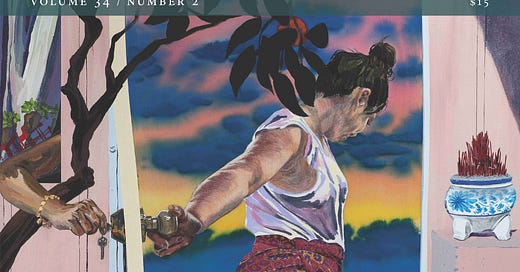The Tragic Demise of a Literary Journal
Gettysburg College to Eliminate the Gettysburg Review After 35 Years
PLEASE TAKE ACTION NOW:
Email riuliano@gettysburg.edu and jbookwal@gettysburg.edu [We're getting some reports that emails are getting blocked. You can also try: officeoftheprovost@gettysburg.edu]
Send letters: Robert Iuliano, Gettysburg College Office of the President, 300 N. Washington Street, Gettysburg PA 17325.
Or call: (717) 337-6010, the president’s office; (717) 337-6820, the provost’s office.
Late last week, I learned of the imminent demise of one of this country’s most extraordinary literary journals, The Gettysburg Review, where I was honored to have served as managing editor from 2004-2011. The backdrop to this bad episode in the life of contemporary American literature and art comes into clear focus with these lines in an announcement made by the president of Gettysburg College (where the magazine has been produced for thirty-five years), Robert Iuliano:
“[…] the changing demographic and enrollment realities across higher education require us to be as strategic as possible in the investment of our limited resources. We must have a more intentional focus on the programs and activities that directly and significantly enhance student demand and the overall student experience.”
Several curious double-speak phrases bloat these sentences: first, enrollment realities, which according to the college’s own report on its enrollment, are robust. Then the phrase limited resources: Iuliano omits any mention of a very recent, unrestricted donation of $10 million. (Here’s a slightly Kafaesque backstory: the donor, who had an illustrious career in finance, is an alumna and was an English major ; she also sits on the boards of two New York City dance companies.) Finally, in response to the last sentence, the Review not only serves students directly, it also enhances their student experience by providing internships and work-study opportunities, replete with lasting relationships after those students graduate. The Review co-sponsors with the English Department a reading series that has brought and continues to bring contemporary authors to campus. During the years of the summer conference hosted by the magazine, students received scholarships to attend workshops with award-winning writers.1
The bigger picture: the arts don’t matter very much in the corporate mindedness of present-day college and university administrators. They are disposable, nonvocational, untrustworthy. How will you learn about a bottom line if all you write are lines of poetry? Storytelling—be it in print, visual media, or performance—can now practically be mass produced by computer models, so why bother nurturing creativity in higher education? And, if we chip away at the creative arts, which of the seven liberal arts will be next to go?2
By publishing prose, poetry, and a selection of work by a contemporary painter, the Gettysburg Review—like other literary journals that feature excellent written and visual work—illuminates what it means to be human. Such art might be messy, often without stated, measurable objectives. Such illumination might seem, without the weight and measure of empiricism, frivolous as a pursuit. What a pity that anyone thinks like this.
If you are reading this newsletter, you likely value the arts. Because of this, I urge you to call or write to the president and provost of Gettysburg College and tell them that the literary journal they have had the honor of hosting these past thirty-five years is a treasure, to be cared for now and in the future.
When I worked at the Review, it was a quarterly publication with a full-time staff of four, several part-time, work-study student employees, and up to two student interns per semester. Today the magazine (reduced in 2022 to a tri-annual), employs two full-time editorial staff (who do not have academic appointments and therefore no job security). Five editorial assistants, four interns work there (and likely two to four work-study students as well). Additionally, the production of the Review involves a freelance designer, a typesetter, and a printer (which happens to be located in a town nearby the magazine and its host institution, Gettysburg College). All of these people will lose work or revenue with the elimination of the magazine.
The seven liberal arts in modern Western education are: Life Sciences, Physical Sciences, Logic (including mathematics and statistics), Philosophy, History, Social Sciences, and Creative Arts.





As a former student intern at The Gettysburg Review in the very early 90s, I was extremely saddened to hear of this decision. My student experience WAS most definitely enhanced by this experience, and I was proud to be an English Major and student of Peter Stitt, founder of The Gettysburg Review. I was privileged to participate in an exacting editing process and be immersed in high level prose and poetry by renowned authors. As an English Major I believed that the ability to write and construct an exposition or argument was crucial no matter what one’s chosen department or profession. Having publications with a high level of discourse on campus is simply oxygen. Discourse is more important than just directed paths.
I am so disappointed that in the case of GR’s shuttering, the discernment process itself was flawed and that the administration has undermined the commitment to liberal arts. I can only hope the closing of the journal can be reconsidered with a constructive attitude.
Thank you. Keep talking. Living and dying by bar code boxes.